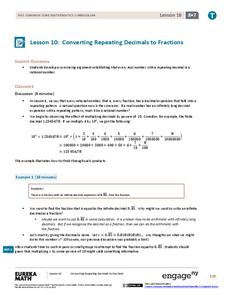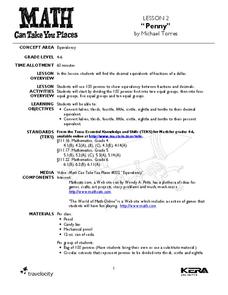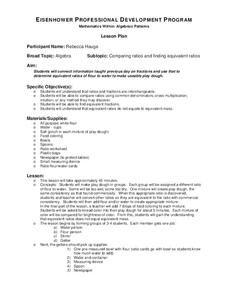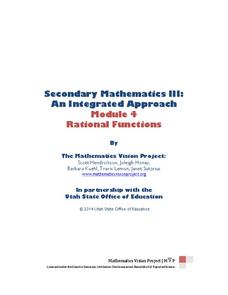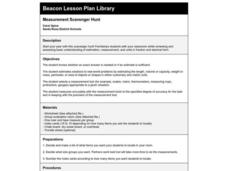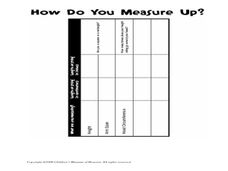EngageNY
Decimal Expansions of Fractions, Part 2
Develop your pupils' understanding of fractions and their decimal equivalence using the 12th lesson in this series. Scholars learn an alternative to long division that results in converting fractions to decimals that emphasize fractional...
EngageNY
Converting Repeating Decimals to Fractions
Develop a process with your classes for converting repeating decimals to fractions. Through this process, pupils understand that any repeating decimal can be written as a fraction. The 10th lesson in this 25-part module helps...
Illustrative Mathematics
Running Laps
If you run more laps, did you run further? Well, it depends. If the laps are different lengths, you need to do some math to answer that question. The goal of this task to is compare two fractions. Young learners represent the real-world...
Curated OER
Bye, Bye, Bye, Fraction Phobia!
Young mathematicians utilize video, the internet, and hands-on learning experiences in order to recognize that fractions aren't as "scary" as they first appear, and that we use them every day in our lives. The hands-on activities in this...
5280 Math
Decimal Patterns
Find patterns in the process instead of the result. Learners convert series of decimals and fractions identifying patterns along the way. The lesson includes nine problem tasks with progressively more involved patterns.
Concord Consortium
Hockey Pucks
Package design is a mathematical task for any business. Young scholars use a package design to determine the number of packages required for specific shipments. Using ratios, proportions, and fractions, they make decisions about the best...
EngageNY
Adding and Subtracting Rational Expressions
There's a fine line between a numerator and a denominator! Learners find common denominators in order to add and subtract rational expressions. Examples include addition, subtraction, and complex fractions.
EngageNY
Multiplying and Dividing Rational Expressions
Five out of four people have trouble with fractions! After comparing simplifying fractions to simplifying rational expressions, pupils use the same principles to multiply and divide rational expressions.
Curated OER
Penny
Students explore the concept of equivalency. In this equivalents lesson, students use pennies to show equivalency as they divide them into groups. Students also convert the pencils into decimals and fractions.
Curated OER
Comparing Fractions
Young scholars use the assistance of computers to explore reducing fractions. Using various internet activities, students experience comparing and ordering fractions. They develop methods to estimate the value of fractions.
EngageNY
Completing the Square (part 2)
Give classes confidence in completing the square with a resource that develops the process of completing the square of more complex problems, including fractions and values greater than one. It then uses quadratic modeling for...
Curated OER
Mathematics Within: Algebraic Patterns
Students comprehend that ratios and fractions are interchangeable. They compare ratios using common denominators, cross multiplication, and intuition. Students find equivalent fractions. They comprehend that equivalent ratios do not...
Mathematics Vision Project
Module 4: Rational Functions
Time to study the most sensible function — rational functions! The seven-lesson unit develops the concept of a rational function through a connection to rational numbers and fractions. Scholars graph functions, solve equations, and...
EngageNY
Estimating Quantities
Apply the concept of magnitude to estimate values and compare numbers. The ninth lesson of the 15-part series asks learners to write numbers to their next greatest power of 10 and then make comparisons. Scholars begin to understand the...
Curated OER
Filling the Glass (Water, Air, and Fractions)
Learners predict which of two glasses is 1/2 full using visual estimation, height measurement, and liquid measurement methods. Mathematical equations to accurately solve the problem are determined and verified.
Curated OER
Measurement Scavenger Hunt
Students review estimation, measurement, fractions, decimals while familiarizing themselves with a new classroom at the beginning of the year.
Curated OER
Solve algebraic proportions.
Students solve algebraic proportions. In this algebra lesson, students convert between fractions, percents and decimals. They solve problems using the distributive property.
Curated OER
Probability
Fifth graders study probability of events. They predict outcomes, and participate in hands-on experiments to find the probability of specified events. Afterward, 5th graders write probability of events in fractions and decimals.
Curated OER
Perform Accounting Functions
Students practice performing various accounting functions. Given analysis records, they prepare cost and revenue analysis based on specific criteria. They complete handouts and review their answers as a class. They also discuss the...
Curated OER
Goobers. Goobers? Goobers!
Students begin the lesson by noting the many ways in which to use peanuts. In groups, they use the internet to research the work of George Washington Carver. They discover the allergies and nutritional information of the peanut and...
Curated OER
Ornithology and Real World Science
Double click that mouse because you just found an amazing instructional activity! This cross-curricular Ornithology instructional activity incorporates literature, writing, reading informational text, data collection, scientific inquiry,...
Curated OER
A Slice of Pi
Math pupils, by viewing a video, discover the history of pi and some of the applications of its uses in the world today. They conduct an experiment by measuring the diameter and circumference of various circular objects to calculate...
Curated OER
One Size Fits All, Part 1
Can you tell how tall someone is just by looking at their feet? In this activity, young mathematicians measure their height, arm span, and foot size, graph their findings, and answer questions about how these measurements are related....
Curated OER
How Do You Measure Up?
Students measure their body. In this measurement lesson plan, students use a string to measure their height and the circumference of their head. They record this information on the worksheet provided and answer questions as a group.

